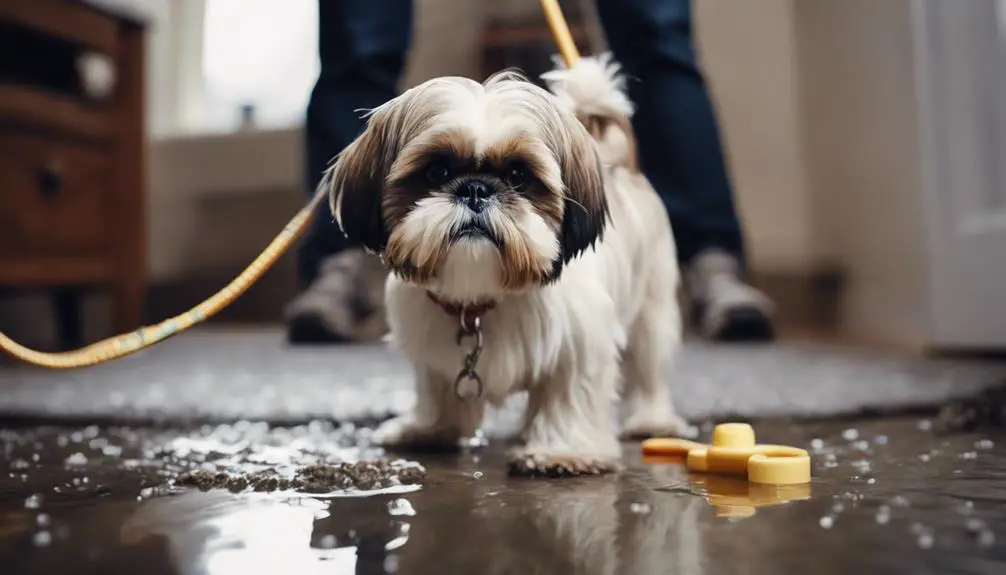When you notice your Shih Tzu barking incessantly, chewing everything in sight, or showing signs of aggression, it's easy to feel frustrated. However, these behaviors aren't just your pet acting out; they're indicators of deeper issues such as anxiety, boredom, or other stresses. They're not trying to be troublesome—they're trying to tell you something. By shifting your perspective and seeing these actions as a form of communication, you'll uncover the real reasons behind their behavior. Now, let's explore what your Shih Tzu might be attempting to communicate and how you can help alleviate their distress.
Understanding Excessive Barking

If your Shih Tzu's barking seems incessant, it's important to understand that this may be their way of signaling distress or unmet needs. Barking is a natural behavior for dogs, but when it becomes excessive, it's usually a sign that something isn't right. You need to become a bit of a detective to get to the bottom of this.
First, consider their environment. Shih Tzus are social creatures that crave interaction. If they're left alone for long periods, they might feel isolated or anxious, which can lead to barking. Are you providing enough mental and physical stimulation? Without adequate exercise and play, your Shih Tzu might be using barking as an outlet for pent-up energy.
Next, assess their routine. Sudden changes can unsettle them. Have there been any recent disruptions in your household that could be affecting them? Consistency is key for dogs.
Health issues can also lead to increased barking. Pain or discomfort often leads dogs to vocalize more than usual. If none of the above seems to apply, a visit to the vet can rule out any medical causes.
The Problem With Persistent Chewing

Just like barking, frequent chewing in Shih Tzus often signals underlying issues that need addressing. You might find your beloved pet gnawing on everything from shoes to furniture, which can be frustrating. However, it's important to understand that this behavior isn't just mischief; it could be an expression of anxiety or lack of stimulation.
Chewing is a natural action for dogs, especially for a breed as spirited as Shih Tzus. It helps them explore their environment and keep their jaws strong. But when it becomes compulsive, it's typically a sign they're not getting what they need—be it mental stimulation or physical exercise. They might be bored or anxious, and chewing provides a temporary outlet for their pent-up energy.
To tackle this problem, first look at your dog's daily routine. Are they getting enough playtime and interaction? Without sufficient activity, your Shih Tzu's excess energy needs to be released somehow, and unfortunately, your belongings might just be the most accessible outlet.
Understanding the root cause of their chewing can transform this destructive habit into an opportunity for bonding and behavioral improvement. Introducing puzzle toys and scheduling more interactive plays can greatly help in channeling their energy positively.
Addressing Aggressive Outbursts

While addressing your Shih Tzu's chewing habits can improve their behavior, it's also important to tackle any aggressive outbursts they may exhibit. Aggression in Shih Tzus isn't just about them being 'naughty'; it's often a manifestation of underlying issues. This could be due to fear, anxiety, or even a lack of proper socialization. Understanding the root cause is essential to effectively addressing this behavior.
Firstly, observe when these outbursts occur. Is it during play, when strangers approach, or in response to specific noises? Pinpointing the triggers helps you anticipate and manage their reactions better.
It's essential not to punish aggression with aggression. Instead, use positive reinforcement to encourage calm behavior. When your Shih Tzu behaves well in a typically triggering situation, reward them with treats or affection. This not only promotes good behavior but also strengthens your bond.
Consulting a professional dog trainer or a behaviorist can be extremely beneficial. They can offer tailored advice and strategies, ensuring you're equipped to handle these outbursts safely and effectively.
Digging: More Than Mischief

Digging in your Shih Tzu may signal deeper issues than simple mischief. While it's easy to chalk it up to a playful quirk, this behavior often points to unmet needs or emotional distress. You mightn't realize it, but your furry friend could be experiencing anxiety or boredom. Shih Tzus are known for their need for companionship and stimulation; without it, they might start digging as a way to cope.
Consider the environment you've provided. Is your Shih Tzu left alone for long periods? Does he have enough toys and activities to keep him engaged? Lack of interaction and stimulation can lead to feelings of isolation, prompting your dog to dig in an attempt to entertain himself or even to escape.
Also, think about the exercise your pet gets. Shih Tzus mightn't need extensive physical activity, but regular playtime and walks are essential for their mental and emotional health. A lack of adequate physical exercise might be pushing your dog to find other ways to expend his energy.
Solving Potty Training Issues

Addressing potty training issues in your Shih Tzu requires understanding their unique needs and signals. It's not just about stubbornness or disobedience; often, it's a sign they're not comfortable or clear about where and when to relieve themselves. You need to be patient and consistent.
Start by establishing a strict schedule. Dogs thrive on routine, so take your Shih Tzu out at the same times every day. Pay close attention to signs that they need to go, like sniffing or circling, and immediately take them to their designated potty area.
Make sure this spot is quiet and free from distractions. Shih Tzus can be sensitive to noisy or busy environments, which can deter them from going. After they've successfully done their business, reward them with a treat or affection. Positive reinforcement goes a long way in making them associate the act with good things.
If accidents happen, don't react harshly. Instead, gently lead them to the potty area to reinforce the correct behavior. Remember, scolding can make them anxious, complicating the training process.
With your understanding and guidance, your Shih Tzu will learn where it's appropriate to go and start signaling you when they need to.
Conclusion
Remember, when your Shih Tzu acts out, it's not just misbehavior; it's a plea for help. Whether they're barking excessively, chewing persistently, showing aggression, digging, or struggling with potty training, these actions are signs of deeper issues like anxiety, boredom, or distress.
By understanding and addressing these underlying causes, you can help alleviate their discomfort and enhance their happiness. Let's not just discipline—let's listen, understand, and heal together.


